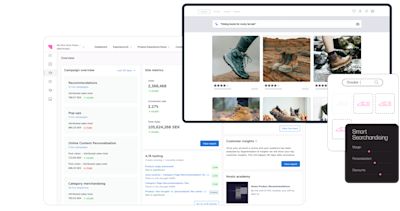
If you're running an ecommerce store, you already know this: customers expect speed, relevance, and seamless experiences. One of the most critical moments in a shopper’s journey is the search experience.
Unfortunately, for many brands, native or traditional site search tools fall short. They often deliver frustrating, irrelevant results, relying solely on keyword matching while overlooking the nuance of human language and shopping intent.
That’s where AI-powered personalized search becomes essential. And with the introduction of Huginn, our new Agentic AI layer, search has taken its next evolutionary leap.
What is AI search?
AI search refers to a search experience powered by artificial intelligence that adapts dynamically to individual shoppers. It goes beyond basic personalization to interpret complex, multi-layered queries, understand nuanced shopper intent, and respond with contextually relevant results.
Rather than showing the same product results to everyone, AI search considers personal behavior, preferences, and real-time context, including geography, seasonality, size, and brand affinity, to surface the most appropriate outcomes. It also handles natural language queries like “running shoes under $100 for flat feet” or “black dress for a winter wedding” with precision.

Take the example of a shopper searching for “lightweight jacket.” A generic search tool might serve every product with "jacket" in its name. A personalized AI search engine, like Deep Search, recognizes the shopper’s location, browsing history, seasonal interests, preferred size, and favorite brands to show breathable, unlined options in lighter colors – tailored to their actual intent.
This kind of search experience reduces bounce rates, improves engagement, and increases conversions.
Why traditional search tools fall short
Standard ecommerce search engines typically rely on outdated, rule-based models. They treat search like a simple keyword matching game: if the word appears in a product title or description, it gets included. This static approach doesn’t understand nuance, doesn’t adapt to behavior, and doesn’t improve over time.
The result? Shoppers are shown irrelevant results, get frustrated, and leave your site without converting.
Modern shoppers expect search to be fast, intuitive, and accurate. They expect it to understand what they’re looking for, even if they don't phrase it perfectly. That’s exactly what Deep Search delivers.
Why merchants need AI search to compete
Search is no longer just a feature; it's a revenue driver. Brands that underestimate the power of search are missing out on revenue, while competitors with AI-powered solutions are turning search into their most effective sales channel.
Shoppers who use search are among your most valuable visitors. They're goal-oriented, ready to buy, and expect immediate, relevant results. If your search engine can’t deliver that, they’ll exit your site in seconds and head straight to a competitor who can.
Poor search doesn’t just hurt the user experience; it directly impacts your bottom line:
Increased bounce rates from zero-result pages or irrelevant listings
Lost sales due to frustrated shoppers abandoning their sessions
Lower conversion rates from mismatched results
Weaker retention and lower lifetime value when customers don’t find what they want quickly
In contrast, merchants who invest in AI search enjoy clear advantages:
Superior product discovery keeps customers exploring longer and deeper
Higher relevance leads to faster add-to-cart actions and fewer decision-making obstacles
Smarter merchandising means AI helps push the right products, at the right margin, at the right time, driving your KPIs while keeping control
Real-time personalization ensures your shoppers are always met with the most compelling options

Real-world results prove the impact. For beauty brand Credo Beauty, implementing AI-powered search has delivered an 8.65% conversion rate and $4.2M in attributed sales year-to-date. And for apparel brand O’Neill, a single A/B test comparing:
Rule A: Promoting product views, inventory, full-price items, and the current season’s collection.
Rule B: Prioritized orders and sales per view while reducing the emphasis on full-price items
This resulted in an impressive +43% uplift in conversion rate for their UK store.
These aren’t outliers. They’re examples of what happens when you turn search into a strategic sales lever.
From predictive to agentic: What’s next in AI search?
Huginn, Deep Search’s dedicated agentic AI layer, represents the foundation of this shift. Within our Personalized Search product, Huginn currently powers two agentic features:
AI Synonym Suggestions: Automatically expands shopper queries with smarter, contextual term substitutions.
AI Facets Suggestions (Beta): Dynamically recommends the most relevant filters to help narrow product discovery. (Expected to be generally available in November.)
Huginn acts as an agentic intelligence layer designed to enrich and extend the capabilities of Deep Search. Today, it simplifies backend tasks for merchants and begins enabling smarter shopper interactions through features like AI Synonym Suggestions and AI Facets Suggestions. Tomorrow, it will play a crucial role in delivering conversational, visual, and cross-language search experiences.
From backend feature to strategic growth driver
Search is no longer a backend function, it's a necessary revenue driver. In a world where shopper expectations are rising and competition is just one click away, providing fast, relevant, and intelligent search experiences is no longer optional.
While Deep Search is currently powered by our core experience AI™ engine (which includes semantic search and real-time personalization) our search is growing more intelligent by the day.










